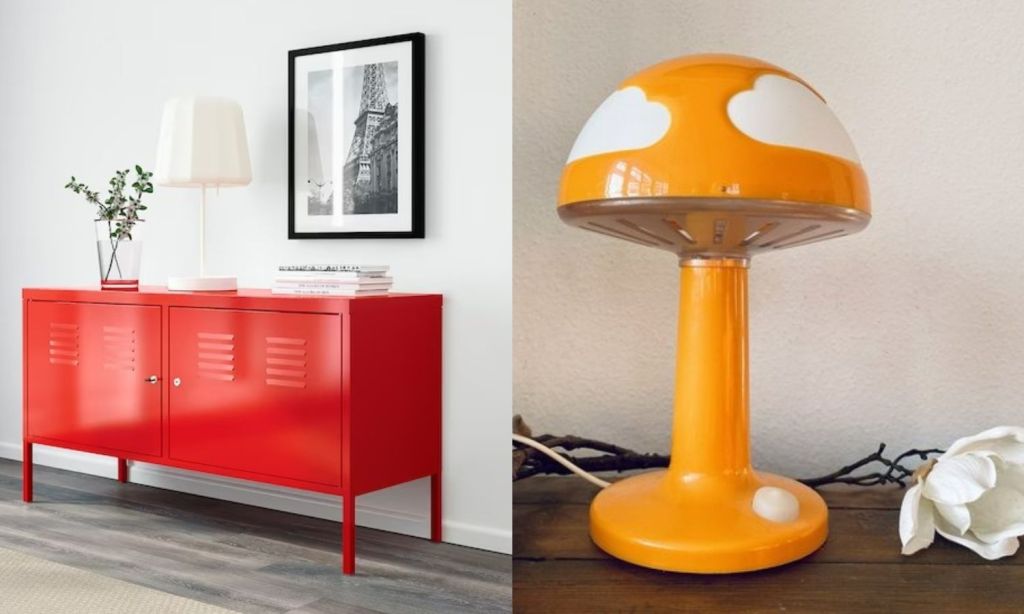Can you believe IKEA has been around for over 75 years? The Swedish company was founded in 1943 by a man named Ingvar Kamprad. He’d been given money by his dad for doing well in school, so used it to set up the company. Furniture, however, was only sold by IKEA from 1948.
Fast forward to today and furniture made by the brand a few decades later (read: still a long time ago), is now, surprisingly, not only back in style but worth a lot.
“Furniture from the 1980s and ‘90s is trending, which is surprising to me only because I can’t believe enough time has passed to make those decades qualify as vintage,” says Anthony Barzilay Freund, editorial director and director of fine art at 1stDibs, told US publication House Beautiful. “Even IKEA furniture from that period is having a moment.”
US publication Domino pointed out that some products, including the Ivar storage system, made circa-1984, and the Billy bookcase, launched circa-1979, are still being produced and sold while many lines over the past 75 years have been discontinued. Pieces from those lines, however, are now being sold online, mostly on Etsy.
Related: Live in a Small Space? Shop These Multifunctional Furniture Pieces
Related: This Aussie Furniture Brand Will Save You Big Time With Its Classic, Yet Durable Designs
“Particularly covetable vintage IKEA lamps that you can buy right now span funky ‘80s to ’90s Memphis styles, but be warned: You are about to enter a glorious online shopping hole that may be difficult to find a way out of,” the publication writes.
Why the Sudden Popularity of ‘Vintage IKEA’?
“The ‘80s and ‘90s were a golden era for IKEA design,” says Devin Shaffer, Lead Interior Designer at interior design platform Decorilla. “Think bold colours, graphic patterns, and innovative materials. These pieces were not only stylish, but also functional, affordable and ahead of their time.”
Michael Carter, Creative Advisor at Australian rug company Double, says he thinks the popularity of vintage IKEA is part of a more general trend of re-emergence of fun within the home we’ve been seeing in the past few years.
“We’re drawn to bright colours, interesting textures and pieces that express our personality, which is part of broader architectural trends that are nodding to the same,” Carter says. “The ‘80s and ‘90s were a powerful pop cultural period with blockbuster movies, TV, music, and the advent of MTV.”
Carter says all of these factors in the ‘80s and ‘90s helped to shape furniture design that moved away from the more angular and serious mid-century styles. In terms of IKEA furniture during this period, many pieces were round and tubular with soft edges.
“As with the 80s generally, there were a lot of bright fun colours,” he says. “The modern take on that feels like people want to create more vibrant, but comfortable spaces — not to be merely admired, but to be wholeheartedly enjoyed.”
What Should You Look for When Shopping ‘Vintage IKEA’?
It’s important to keep in mind when shopping for ‘vintage IKEA’ that some pieces may require some restoration or refurbishment, says Shaffer. While he notes that it can be a fun and rewarding project, it’s important to factor in the cost and time involved before making a purchase.
“Always keep an eye out for rare and limited-edition pieces,” he says. “IKEA has collaborated with several well-known designers over the years, such as Verner Panton and Olle Gyllang, and some of these pieces have become highly sought after by collectors. If you come across one of these pieces in good condition, it could be a valuable addition to your home.”
Carter also notes that you should look for pieces that complement your existing interiors, as investing in vintage IKEA design is an easy way to elevate the energy of a room. “Instead of committing to a complete re-decoration, shop for something that will spark visual interest and make you smile when you enter the space.”
Which ‘Vintage IKEA’ Pieces, in Particular, Are Noteworthy?
When it comes to particular vintage IKEA pieces to look out for, Carter says he loves the Enetri Shelf, designed by Niels Gammelgaard in the ‘80s, as it’s a timeless piece.
“Bookshelves can often feel very solid and imposing in a room, especially when there are brighter colours and patterns tying the room together,” he says. “These floating shelves are genius. They fit seamlessly into almost all spaces, and truly complement a wide range of aesthetics. Definitely a piece to invest in, if you can get your hands on one.”
Carter also mentions the ‘90s Skojig Cloud Table Lamp, designed by Henrik Preutz, as well as the Tajt Armchair, designed by Gillis Lundgen, though it’s not quite an icon of the ‘80s and ‘90s era.
Shaffer says his personal favourite vintage IKEA piece is the PS cabinet from ’95. With its bright red colour, industrial feel and hidden storage compartments, it’s the perfect statement piece for a modern living room or home office.
“Another favourite of mine is the IKEA Klippan sofa, first introduced in 1980,” he says. “With its simple yet elegant design, it has become a staple in many homes, and you can them popping up on vintage furniture sites and in second-hand stores. I love natural wear and tear and, in these cases, you can pair them with some colourful throw pillows and a cosy blanket, and you’ve got a stylish and comfortable seating area.”
Read more stories from The Latch and subscribe to our email newsletter.

